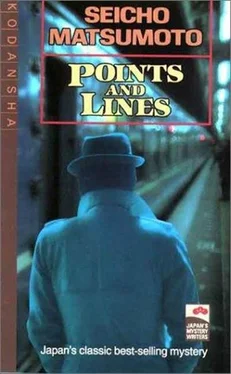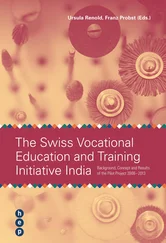Seichō Matsumoto - Points And Lines
Здесь есть возможность читать онлайн «Seichō Matsumoto - Points And Lines» весь текст электронной книги совершенно бесплатно (целиком полную версию без сокращений). В некоторых случаях можно слушать аудио, скачать через торрент в формате fb2 и присутствует краткое содержание. Жанр: Детектив, на английском языке. Описание произведения, (предисловие) а так же отзывы посетителей доступны на портале библиотеки ЛибКат.
- Название:Points And Lines
- Автор:
- Жанр:
- Год:неизвестен
- ISBN:нет данных
- Рейтинг книги:5 / 5. Голосов: 1
-
Избранное:Добавить в избранное
- Отзывы:
-
Ваша оценка:
- 100
- 1
- 2
- 3
- 4
- 5
Points And Lines: краткое содержание, описание и аннотация
Предлагаем к чтению аннотацию, описание, краткое содержание или предисловие (зависит от того, что написал сам автор книги «Points And Lines»). Если вы не нашли необходимую информацию о книге — напишите в комментариях, мы постараемся отыскать её.
Points And Lines — читать онлайн бесплатно полную книгу (весь текст) целиком
Ниже представлен текст книги, разбитый по страницам. Система сохранения места последней прочитанной страницы, позволяет с удобством читать онлайн бесплатно книгу «Points And Lines», без необходимости каждый раз заново искать на чём Вы остановились. Поставьте закладку, и сможете в любой момент перейти на страницу, на которой закончили чтение.
Интервал:
Закладка:
"Forgive me again for coming by unannounced. Do please take good care of your health."
Mrs. Yasuda looked up at him. In that light her eyes were almost blue and very bright. "Thank you for coming," she said quietly.
When Mihara presented the box of cakes she bowed formally to him from her bed. He noticed for the first time that her shoulders were pitifully thin.
The servant accompanied him to the door and while he was putting on his shoes he casually asked, "Who is Mrs. Yasuda's doctor?"
"Dr. Hasegawa. He lives near Daibutsu-mae." It was said without a moment's hesitation. There was even a note of friendliness in her voice as if she were grateful for his interest.
Mihara took the Enoshima Line to Daibutsu-mae. Once again the train was full of school children on a day's excursion.
He had no trouble finding Dr. Hasegawa's private clinic. At the entrance he presented his official card.
Dr. Hasegawa was a stout, ruddy-faced man with white hair, neatly combed. He put aside the business card, which he had been studying, and offered Mihara the chair beside his desk. He waited for Mihara to speak.
"I'm calling on you to get some information concerning a patient of yours, a Mrs. Yasuda."
At this remark, Dr. Hasegawa looked again at Mihara's card. "Is this an official inquiry?" he asked.
"Yes."
"Does it concern the patient's private life?"
"No, neither personal nor private. I merely want to know her state of health. Information of a general nature will be enough."
The doctor nodded. He asked the nurse to bring Mrs. Yasuda's card.
"She has tuberculosis. The treatment generally takes a long time. She's been ill now for three years. To be frank, in her case I see very little hope of recovery. I've told Mr. Yasuda. For the time being, her strength is being sustained by the injections I'm giving her."
"Is she confined to her bed?"
"No, she's able to get up from time to time, but she seldom goes out."
"She doesn't go out at all?"
"She can take short walks. And once in a great while she visits a relative living in Yugawara. She stays there a day or two. That much she can do."
"Do you visit her every day, Doctor?"
"No, not every day; her condition is not that critical. I make a point of going on Tuesdays and Fridays. And sometimes on Sunday afternoon."
The doctor smiled at Mihara's puzzled expression. "Mrs. Yasuda has literary tastes," he explained. "Patients who have a long convalescence often turn to literature. In her case, she's not only an avid reader of novels but sometimes she herself writes short stories and essays."
Mihara recalled the magazines and the foreign novels he had seen in her room.
"I, too, am interested in literature," the doctor continued. "I'm a friend of Masao Kume, the novelist. There are many writers living here in Kamakura but Kume is the only one I know. At my age one is a bit shy about calling on such people. But we have a group here, elderly people for the most part, who like to write-short pieces and poems- and we put out a little monthly magazine. It's our hobby; we turn to it as others do to bonsai, for example. Since we have this interest in common, sometimes I call on Mrs. Yasuda on Sunday afternoons and we talk about literature. We both enjoy it. About six months ago she gave me a copy of a short essay she had written. May I show it to you?"
It was in a little magazine of about thirty pages called Nanrin. Mihara turned to the index. He quickly found the essay, Landscape with Figures. Under the title was the name Ryōko Yasuda. This was her full name, he learned for the first time. He began to read the article with the curious title.
When one is confined to bed for a long time, reading becomes an absolute need. Of late, however, I have become weary of contemporary fiction. When only part of the way through a novel, I begin to lose interest and soon put it aside. One day, when my husband had come to see me, he happened to leave behind a railway timetable. I picked it up out of sheer boredom. A timetable is of no use to me, bed-ridden invalid that I am, but I found it surprisingly interesting. It was far more entertaining than a poorly written novel. My husband uses a timetable very often because of his many business trips. He is familiar with it for practical business reasons, whereas I, an invalid, have become a constant reader not out of necessity but for the sheer pleasure it gives me.
This timetable has the names of all the stations in Japan. As I read them, I can picture each one, even to the surrounding landscape. The small local stations are the ones that really stir my imagination. Toyotsu, Saikawa, Saki-yama, Yusubaru, Magarikane, Ita, Gotō-ji, these are names of little stations on the local lines in Kyushu. Shinjō, Masukata, Tsuya, Furukuchi, Takaya, Karikawa, Amarume lie along the local railways in the Tohoku region. The name Yusubaru, for instance, suggests to me a village set in a deep ravine filled with the luxuriant flora of the south; Amarume, I imagine to be a desolate little town in the northeast, cowering under a sullen sky. In my mind's eye I see the villages, the towns, the mountains that surround these stations, the houses and even the people living there. I recall a phrase in the famous Tsuretsuregusa which says, 'Whenever I hear a name, I seem to be able to visualize the person.' Well, I feel the same way about places. When I am bored, I open to a page in the timetable. No matter which page, I am carried away. I am free to travel through San-in, Shikoku, Hokuriku, just as I please.
But my imagination does not stop there; it extends into the element of time. For example, I may look casually at my watch: it is 1:36 in the afternoon. I turn the pages of the timetable and look for a station marked by the numerals 1:36. I find that at Sekiya Station on the Echigo Line, number 122 has just pulled in. At the same moment, people are getting off number 139 at Akune station on the Kago-shima Main Line. Number 815 has arrived at Hida Miyata. At Fujiu on the Sanyo Line, Iida in Shinshū, Kusano on the Jōban Line, Higashinoshiro on the Ōu Main Line, Ōji on the Kansai Main Line, at all these stations, trains have come to a stop at this same instant.
At this very moment, as I lie abed staring at my emaciated hands, trains are coming to a stop at certain stations in Japan. People from every walk of life and with varied backgrounds are getting on and off these trains. I close my eyes and picture the scene. If I check the time and the station I may even learn how trains pass each other and at which station and at what hour. This can be fascinating! How and when trains connect or pass each other is deliberate and planned, but the meeting and parting of passengers is purely accidental. At such moments I can imagine the ceaseless movements of these thousands as their paths cross and their lives briefly brush past each other in those faraway places. I find more pleasure in my own flights of fancy than in novels born of the imagination of others. It is a pleasure wrung from the dreams of a lonely woman.
The railway timetable with its numbers and Chinese ideographs is one of my favorite books these days.
Mihara finished reading and put the little magazine aside.
"An interesting idea, don't you think?" the doctor remarked. "Of course, these thoughts occur to her because she is confined to her room."
"I suppose so." Mihara's answer was curt. How Ryōko Yasuda felt or what she imagined did not interest him. What she had written at the beginning of the article was the important point. "My husband uses a timetable very often because of his many business trips. He is familiar with it…" For a moment, Mihara forgot the doctor's presence.
By the time Mihara had returned to his office it was close to eight o'clock. Inspector Kasai had already gone home. On the desk, under an ink bottle, Mihara found a telegram. It had arrived sooner than expected, he thought as he opened it. The message was from the Sapporo Central Police Station in Hokkaido and was a reply to his inquiry.
Читать дальшеИнтервал:
Закладка:
Похожие книги на «Points And Lines»
Представляем Вашему вниманию похожие книги на «Points And Lines» списком для выбора. Мы отобрали схожую по названию и смыслу литературу в надежде предоставить читателям больше вариантов отыскать новые, интересные, ещё непрочитанные произведения.
Обсуждение, отзывы о книге «Points And Lines» и просто собственные мнения читателей. Оставьте ваши комментарии, напишите, что Вы думаете о произведении, его смысле или главных героях. Укажите что конкретно понравилось, а что нет, и почему Вы так считаете.












